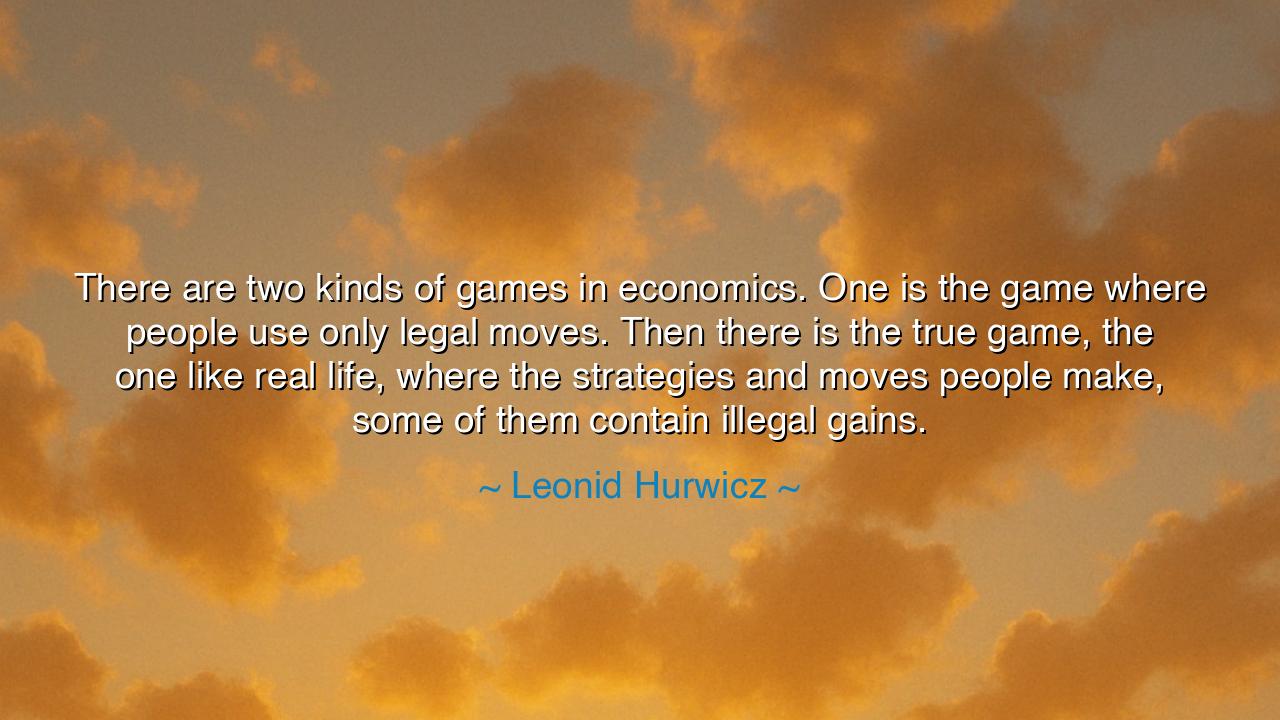
There are two kinds of games in economics. One is the game where
There are two kinds of games in economics. One is the game where people use only legal moves. Then there is the true game, the one like real life, where the strategies and moves people make, some of them contain illegal gains.






Listen, O seekers of wisdom, to the profound words of Leonid Hurwicz, a sage of numbers and human nature, who proclaimed: "There are two kinds of games in economics. One is the game where people use only legal moves. Then there is the true game, the one like real life, where the strategies and moves people make, some of them contain illegal gains." In this utterance lies a mirror to the human soul, a reflection of the eternal tension between virtue and cunning, between law and the raw, unbridled currents of human desire. Hurwicz’s words summon us to witness the duality of existence: the surface of order and the depths of reality, where rules bend under ambition and necessity.
From the dawn of civilization, humans have danced upon the thin line between the lawful and the expedient. In Athens, merchants and statesmen alike learned that strategy often transcends the statutes inscribed upon the stone; in Venice, the shrewd traders of the canals accumulated wealth through cunning, not merely by fair trade. Hurwicz reminds us that economics, like life itself, is not merely a game of legality; it is a game of human behavior, where ingenuity, audacity, and at times moral compromise, shape the outcomes as profoundly as any law.
Consider the saga of the Dutch East India Company, which rose to glory in the seventeenth century. Its merchants, navigating seas and markets, engaged in legal trade, yet often relied on subterfuge, secret contracts, and monopolistic maneuvers to gain illegal advantages. Hurwicz’s wisdom captures the essence of such enterprise: that the true game—the one reflecting the full spectrum of human ambition—cannot be contained solely within the bounds of the law. It is a tapestry woven of both light and shadow, of honorable conduct and clever transgression.
Yet this observation is not a call to lawlessness, but to discernment. Hurwicz, a Nobel laureate in the realm of mechanism design, teaches that to understand the world fully, one must see it as it is, not as it is prescribed. In markets, in politics, in life, there exists a duality: the formal game, where legal moves govern the play, and the real game, where hidden strategies, risk, and occasional breaches of law shape destinies. To ignore the latter is to walk blind into a storm, believing that appearances alone define reality.
Reflect upon the financial crisis of 2008. Institutions engaged in legal transactions, yet behind the veil of formal structures lay strategies designed to extract advantage through opacity, risk misrepresentation, and systemic exploitation. Hurwicz’s insight pierces the surface: in the true game of life and economics, outcomes are determined not merely by what is lawful, but by what the mind can devise, by how actors navigate the tension between rules and opportunity. History, he suggests, will always honor those who perceive the layers beneath, while chastising those blind to them.
From this understanding springs a lesson as old as the wisdom of Solon and Confucius: know the rules, yes, but do not be naive. Study the legal game, but also perceive the true game with clarity and moral judgment. Recognize that human behavior is complex, that ambition and desire can bend structures, and that insight lies in anticipating both lawful and illicit currents. Hurwicz teaches prudence: the wise do not merely follow statutes; they understand the world in its entirety, seeing both the light of legality and the shadow of unrestrained human action.
Thus, O students of life and commerce, embrace both vision and virtue. Engage in the games of your world with skill and integrity, yet cultivate awareness of the forces that operate beneath the surface. Learn from history, from the Dutch traders, from financiers and strategists, and from the countless actors who navigated the duality of legality and ambition. For wisdom lies not in mere rule-following, but in understanding the full spectrum of human endeavor—the true game, in all its perilous and magnificent reality.
Take this teaching into your own life: act with strategy, honor the law, but perceive clearly the hidden layers around you. Assess both opportunity and risk, integrity and temptation. In doing so, you harness the power of foresight, walk the path of prudence, and navigate the true game of life not as a naive player, but as a wise and vigilant master. The world rewards those who comprehend the depth beneath appearances, for therein lies both survival and triumph.






AAdministratorAdministrator
Welcome, honored guests. Please leave a comment, we will respond soon